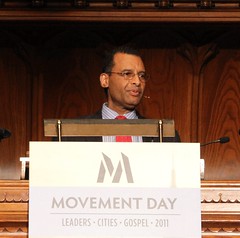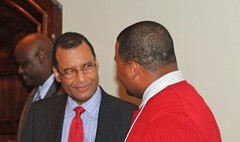Speaking Up for Homeless NYC Churches
As more than 60 New York City churches prepare for their last Sunday worship services in the public schools from which they are scheduled to be evicted February 12, the frustration of some involved in the fight to overturn a city-wide public school worship ban spilled over to prominent city pastors who these warriors say have been silent on the issue.
Unconscionable Silence
This morning, when UrbanFaith talked to Rev. Bill Devlin, co-chair of Right to Worship, the group that has been spearheading efforts to overturn the ban, he was on his way to Albany to meet with state legislators about pending legislation that would allow religious groups to keep meeting in the city’s public schools, and to witness voting on a state senate version of the bill. It has since passed in a 54-7 vote but will need approval of the full Assembly and the governor’s signature before becoming law.
Devlin said he and others had been trying to engage prominent New York City pastors on the issue for about four weeks.
“We have called them personally. We have sent letters. We have left personal notes. We have had personal meetings. We have called them on their cell phones. We have talked to their surrogates as well. We have done everything, I think, humanly possible, to plead with these brother pastors that their fellow pastors are getting evicted as of February 12, 2012. It’s highly unfortunate that we’re not getting any kind of a response from any of them,” said Devlin.
He said he knows Rev. Tim Keller and several people in the “higher echelon” of leadership at Keller’s Redeemer Presbyterian Church in Manhattan, and had talked to some of these leaders over the weekend. He and another source who asked to remain anonymous, but who is affiliated with one of the affected churches, both said Redeemer was expected to issue a statement on the pending evictions this afternoon. UrbanFaith could not independently confirm this as multiple emails and phone calls to Keller and his associates went unanswered.
“I find it really unconscionable that fellow pastors who have been ministering alongside together with these larger churches, particularly going back to 9/11 and the efforts there, that now there’s a deafening silence,” said Devlin. “The pastors that are being affected, they’re sad, brokenhearted. They wish that their fellow brothers would come alongside.”
Building Inside Relationships
Rev. Dr. A.R. Bernard, pastor of the Christian Cultural Center in Brooklyn, told UrbanFaith that he addressed the issue with his congregation Sunday and that some members had participated in a 17,000 person protest walk over the Brooklyn Bridge January 26.
“My methodology, of course, is not marching across the bridge,” said Bernard. “It’s building relationships inside and trying to create influence.”
Bernard expressed concern about “moving parts,” “unseen agendas,” and “outside entities” at play in the battle.
“The concerns are if there’s any extended period of time that allows a defensive and offensive to build against those who would like to see this enforced. It’s an unfortunate situation, but it’s not as easy as ‘We’re being discriminated against,’” said Bernard.
Nonetheless, he affirmed the ministries of the affected churches and expressed unequivocal support for them.
“I am in support of these churches. They should do everything within their power to try to stop this from happening, to try and overturn it. … I believe that there is no harm whatsoever in continuing historical accommodations that have been made to the churches,” said Bernard.
However, he also said, “I understand my influence. When I get up and make a statement, there’s a lot of weight put on it, and I want to make sure it’s an intelligent statement, not based on hearsay or people’s opinions. So I have to be very careful in what I say. Both the church community and the state weighs what I have to say.”
Where Were They for the Same-sex Marriage Battle?
Bishop Joseph Mattera, pastor of Resurrection Church of New York in Brooklyn, bristled at the notion that he hadn’t been involved in public efforts to overturn the ban, saying he had been working on the state level while city councilman Rev. Fernando Cabrera had led efforts locally.
“Basically I’m the one who got the legislation to be done with my contact with leading senators. I worked about six weeks non-stop on this thing, behind the scenes, calling, talking to the mayor’s aide, talking to senators, assembly people. My staff didn’t even hardly see me for six weeks,” said Mattera.
He said he met with the New York City schools chancellor Dennis M. Walcott, attended a city-wide prayer gathering, and encouraged evangelical leaders at a Texas meeting about the presidential campaign to publicize the plight of affected churches nationally. The only thing he hasn’t done, Mattera said, is attend press conferences because of scheduling conflicts.
Mattera compared this battle to the fight against same-sex marriage in New York City, saying he spearheaded that effort and pastors of prominent churches failed to speak up then too.
“I warned a lot of these pastors who didn’t stand with us that if you didn’t stand up for traditional marriage then religious freedom would be taken next. A lot of these guys complaining weren’t there for the ten year battle,” said Mattera.
Offer Space instead of Taking Advantage
Bishop Roderick R. Caesar, pastor of Bethel Gospel Tabernacle Fellowship International in Jamaica, Queens, also said he has been “vocal” in his support of the affected churches.
“I have made my calls to city government, letting them know I felt that they were doing us a disservice,” said Caesar.
He too offered unequivocal support for the churches, saying congregations with facilities and extra space should offer it to the soon-to-be homeless churches “instead of looking at that as an opportunity for us to glean members.”
“Separation of church and state has nothing to do with real estate. It has everything to do with forced religion. The manner in which the people who framed these new policies have interpreted the law is detrimental to what the law was intended,” said Caesar.
He described the Board of Education ban as “a plot” by people who “want to stamp out any influence that the church could be for the good of a community” and said it will remove an income stream that schools have used to subsidize programs that benefit children.
“There’s a ripple effect, and I really think that the mayor was a little hasty in his decisions and knowing government, I think they’re trying to find a tactful way to back down, if that’s possible, without saying they were wrong, because they don’t like to admit fault,” said Caesar.
Update:
Rev. Dr. Floyd H. Flake, pastor of Greater Allen A.M.E. Cathedral of New York in Jamaica, Queens, emailed the following statement after UrbanFaith went to press with this story:
“I am aware of several churches that had their beginnings in a public school. In almost every case they were able to over time raise enough funding to build their own church facility. Since most schools are closed on Sunday, I see no reason why they could not be used by churches that are trying to build up their congregations. The majority of these congregations, that I am aware of, have no intentions of making the school a permanent location for their worship. I believe that the process that has been in place has worked extremely well and has caused a minimum of problems for city schools. Therefore, I would urge that they are allowed to continue even if it is necessary to sign an agreement regarding how many years they anticipate having to use space in the schools.”
Update 2:
Rev. Dr. Tim Keller, pastor of Redeemer Presbyterian Church in Manhattan, released a statement in support of the affected churches Feb. 7. It said in part, ‘I am grieved that New York City is planning to take the unwise step of removing 68 churches from the spaces that they rent in public schools. …I disagree with the opinion written by Judge Pierre Leval that: “A worship service is an act of organized religion that consecrates the place in which it is performed, making it a church.’ This is an erroneous theological judgment; I know of no Christian church or denomination that believes that merely holding a service in a building somehow ‘consecrates’ it, setting it apart from all common or profane use. To base a legal opinion on such a superstitious view is surely invalid. Conversely, we concur with Judge John Walker’s dissenting opinion that this ban constitutes viewpoint discrimination and raises no legitimate Establishment Clause concerns. A disproportionate number of churches that are affected by this prohibition are not wealthy, established communities of faith. They are ones who possess the fewest resources and many work with the poor. Redeemer has many ties with those churches and their pastors, and our church community invests time and resources to assist them to be good neighbors in their communities.”
What do you think?
Should New York City’s influential pastors speak up on behalf of their soon-to-be homeless brethren?


